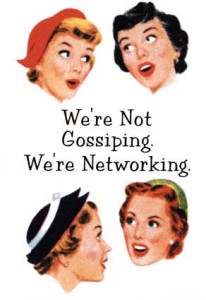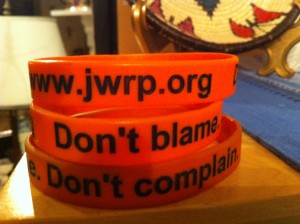JWS Kicks Off Anti-Gossip Campaign
My favorite souvenir that I brought home from Israel this summer was not the sterling silver Star of David necklace. It was not the hamsa artwork or the Medjool dates that tasted like candy. It was a cheap rubber bracelet, bright orange, that clashed with every outfit and had these words printed in black: “Don’t Blame. Don’t Complain.â€
The moment we got off the plane, before our suitcases were unpacked, everyone in our group was given this stretchy wristband to remind us of an important lesson. A lesson that could change the way we think and how we live and treat others.
We were told to wear the bracelet every day, all day. Every time we complained about something or talked negatively, we had to switch it to the other wrist. Can you imagine? A bunch of Jewish women traveling across country together, and we’re not allowed to kvetch? What fun is that?
So at first it was a joke. I didn’t last five minutes before I was moving my new accessory back and forth whenever I made statements like:
 “I can’t get up that early for breakfast.â€
 “My feet are killing me.â€
 “She looks ridiculous wearing Keens with a long skirt.â€
“You’re crazy if you think I’m changing out of my wet swimsuit in an overheated, crowded bathroom at the Dead Sea in front of all these naked women.â€
I swear, I moved my bracelet so many times I had a skin rash. And that was only day one. Finally, I asked for an extra wristband and wore matching ones on both hands to make this exercise easier. I know, that’s cheating.  Maybe I should have worn them on my ankles as well.
All kidding aside, the truth is I was much more aware of how often I blamed and complained. I also paid more attention to what other people said and how it made me feel. What we verbalize and what we think truly has an impact on our psyche, our souls. And our words most definitely affect others. As parents, if we gossip and put other people down, our children will do the same. Where do you think bullying comes from?
So, it got me thinking, if I can’t talk negatively about something or someone, what can I talk about? I needed to reprogram my brain, and since it takes about 30 days to form a new habit, I had my work cut out for me. Fortunately, the Jewish Women’s Society provides the tools to reinforce values, such as kindness. At the launch of the JWS, we were given gossip charts, which allows us to keep track of how we use ethical speech. Kind of like a food journal for dieters. The idea is for us to be more accountable for our words and actions. The Jewish twist is that we make a commitment to speak more positively as an act of goodness and in the merit of a loved one. For example, if we know someone who is sick and needs healing, we practice our positive speech in his or her name, which gives us another purpose. I stuck mine on my refrigerator, so I see it often.
“Great minds discuss ideas. Average minds discuss events. Small minds discuss people.â€
That quote comes from Eleanor Roosevelt, but actually the idea originates from a Jewish teaching.
In the law of Lashon Hara, which literally means “bad tongue,” we are forbidden to tell a negative statement about another person that damages their character, even if it’s true. The Rabbis know that criticizing people is part of human nature, which is why we need to practice turning our negative thoughts into positive ones.
The Netziv, a great Rabbi of the 1800’s, explained that there are four types of creations: inanimate objects, plant life, animals and finally, humans. We are defined as speakers, meaning that the distinctive feature that separates people from other living things is that we can communicate by speech. When we speak with a positive intent, we create good. When we speak negatively and are judgmental, our words can destroy a soul.
In fact, gossip hurts three people: The one who speaks it, the one who hears it, and the one who is being spoken about. When you think about it, that’s a lot of collateral damage, and it’s impossible to take back words.
We live in an era of social media that makes it so easy to spread gossip and bad feelings, so this lesson is more important than ever. Kids are killing themselves over bullying, and it’s got to stop.
Please join me in the 30-day challenge to turn negative talk into positive speech and spread goodness and kindness. It starts with ourselves, reaches to our families, community, world.
For a thought-provoking exploration of Lashon Hara and how gossip can be transformed into a more positive, meaningful life, please join the JWS and come to our inaugural class based on Lori Palatnik’s bestselling book, “Gossip: Ten Pathways to Eliminate From Your Life and Transform Your Soul.” The same class will be held on two days, pick which one is convenient for you. Monday, March 31, 9:30 a.m. or Tuesday, April 1, 7 p.m., at the JCC-Creve Coeur, Arts and Education Building, 2 Millstone Campus Drive.
For more info on JWS and to RSVP to the class, please contact Peggy Umansky at 314-527-1719 or JWSociety@hotmail.com.
If you like what you read, please “like” my blog Mishegas of Motherhood, and let’s share our Jewish journey together.




